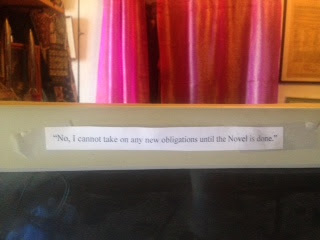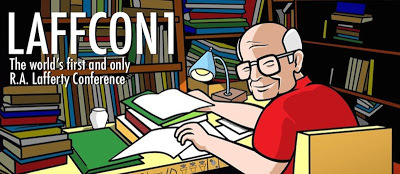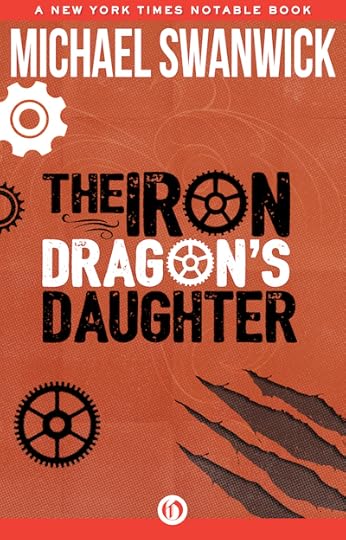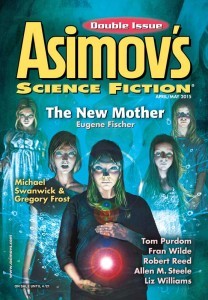Michael Swanwick's Blog, page 112
June 15, 2016
Working Hard and Hardly Working
.

One of the central ironies of a writer's life is that you look the least productive when you're working the hardest. And vice versa. When a new novel comes out, it represents work that was completed perhaps a year earlier. But it sure makes you look good. Conversely, when you're working hardest, there's nothing new coming out and you appear to be stuck somewhere between lazy and indolent.
Right now, on the stands... pretty much nothing. But I'm working very hard on The Iron Dragon's Mother . And I've got a number of lesser but very cool projects in the pipeline, which will be coming out at irregular intervals over the coming year. So I'm busy as can be.
Most of these projects I can't mention, for various reasons. But I will say that The Universe Box Project over at Marianne's Dragonstairs Press moves steadily toward completion, and that when it is done, it will be something rare and wonderful.
Oh, yeah, and my newest short fiction collection, Not So Much, Said the Cat should be on the stands in not terribly long. But that's the other side of the coin. It contains seventeen stories, written over the course of several years. So its appearance will not indicate that I am being industrious -- just that I was so, once upon a time.
Above: The shelves where I keep copies of all my publications. They filled up long ago, and everything since is scattered about in shelves and boxes elsewhere in the house.
*

One of the central ironies of a writer's life is that you look the least productive when you're working the hardest. And vice versa. When a new novel comes out, it represents work that was completed perhaps a year earlier. But it sure makes you look good. Conversely, when you're working hardest, there's nothing new coming out and you appear to be stuck somewhere between lazy and indolent.
Right now, on the stands... pretty much nothing. But I'm working very hard on The Iron Dragon's Mother . And I've got a number of lesser but very cool projects in the pipeline, which will be coming out at irregular intervals over the coming year. So I'm busy as can be.
Most of these projects I can't mention, for various reasons. But I will say that The Universe Box Project over at Marianne's Dragonstairs Press moves steadily toward completion, and that when it is done, it will be something rare and wonderful.
Oh, yeah, and my newest short fiction collection, Not So Much, Said the Cat should be on the stands in not terribly long. But that's the other side of the coin. It contains seventeen stories, written over the course of several years. So its appearance will not indicate that I am being industrious -- just that I was so, once upon a time.
Above: The shelves where I keep copies of all my publications. They filled up long ago, and everything since is scattered about in shelves and boxes elsewhere in the house.
*
Published on June 15, 2016 12:11
June 13, 2016
The Song of the Vikings
.

I just finished reading Song of the Vikings by Nancy Marie Brown. What a terrific book! For all my obsession with mythology, I had never looked into the author of the Edda , of Heimskringla , and of so much more. So I was astonished to discover how much is known about the life of Snorri Sturluson, the man who wrote down most of what we know about the Norse gods.
Snorri, it turns out, was both the richest and the most powerful man in Iceland. He was a wily merchant and an ambitious politician in an age when it was pretty much a given that such a man would die by violence. It seems almost unfair that he should also be the greatest poet of his time and place, but there it is. To our lasting benefit, he wrote down (and in some cases may have invented) the stories of the Norse gods at the last possible moment when it could be done. A generation after his death, the poetic tradition he worked in was dead, and the stories on their way to oblivion.
Nancy Marie Brown is the ideal guide to the life and works of Snorri. She knows the material up one side and down the other. Occasional asides provide glimpses into the enormous body of scholarship that has accrued around Icelandic literature. She has a good sense of what the casual reader will find of interest and leaves out a great deal that the specialist must surely find fascinating.
Most importantly, this woman can write. The prose is fluid, the sentences and paragraphs pleasurable, and she sails the reader through a great deal of complicated material with grace and clarity. I loved the material, but I also found a great deal of joy in the telling.
If this is your sort of thing, check it out. I'm sure you can find it on ABE but if not, then Interlibrary Loan is your friend.
*

I just finished reading Song of the Vikings by Nancy Marie Brown. What a terrific book! For all my obsession with mythology, I had never looked into the author of the Edda , of Heimskringla , and of so much more. So I was astonished to discover how much is known about the life of Snorri Sturluson, the man who wrote down most of what we know about the Norse gods.
Snorri, it turns out, was both the richest and the most powerful man in Iceland. He was a wily merchant and an ambitious politician in an age when it was pretty much a given that such a man would die by violence. It seems almost unfair that he should also be the greatest poet of his time and place, but there it is. To our lasting benefit, he wrote down (and in some cases may have invented) the stories of the Norse gods at the last possible moment when it could be done. A generation after his death, the poetic tradition he worked in was dead, and the stories on their way to oblivion.
Nancy Marie Brown is the ideal guide to the life and works of Snorri. She knows the material up one side and down the other. Occasional asides provide glimpses into the enormous body of scholarship that has accrued around Icelandic literature. She has a good sense of what the casual reader will find of interest and leaves out a great deal that the specialist must surely find fascinating.
Most importantly, this woman can write. The prose is fluid, the sentences and paragraphs pleasurable, and she sails the reader through a great deal of complicated material with grace and clarity. I loved the material, but I also found a great deal of joy in the telling.
If this is your sort of thing, check it out. I'm sure you can find it on ABE but if not, then Interlibrary Loan is your friend.
*
Published on June 13, 2016 15:56
June 10, 2016
Of Time and the Writer
.

I was contacted recently by a writer -- young, presumably, and probably as yet unpublished -- who wanted me to read and comment a story he or she had written. When I said that, for good and sufficient reasons, I couldn't, the writer demanded to know what those reasons could possibly be.
So I thought I'd explain this here.
1. You're asking someone you don't know to do unpaid work for you.
Yes, I'm capable of doing it. So too, I presume, you're capable of mowing a lawn or painting a wall or washing windows. But I wouldn't dream of asking you to do so for me. It's just not reasonable.
2. You're not the only one who wants me to read and comment on your work.
Forget, for the moment, gonnabe writers. I get requests all the time from editors to read soon-to-be published novels in the hope that I'll give them a blurb. Some of them are by good friends whom I know to be very fine writers. The rest have, at a very minimum, convinced a major publisher to invest in their careers. I can't get to a fraction as many of these as I would like. But they all have priority over a request from a complete stranger.
3. My analytic skills are valuable.
I know a young freelancer who does skilled office work for fifty dollars an hour and grunt-work for twenty an hour. So it's not immodest of me to suppose that I could get significantly more, if I wanted to put my services on the market.
4. People have paid for my literary advice, and it would be an insult to them for me to give away that same advice gratis. (Other than here on my blog, or as favors to close friends, I mean.)
I'm thinking here of the Clarion and Clarion West and Clarion South classes I've taught. Also of the recent writing seminar at Balticon 50. All the students made significant sacrifices for my advice. They'd feel pretty silly if they found out that it could have been had for just the asking.
5. You probably don't really want my advice.
My experience with people who ask for advice is that they don't actually want it. They want to be told that their stories are perfect as they are and that I'm going to bend heaven and earth to find them an agent and a publisher. They don't think that's what they want. But their disappointment when I give them a list of ways their work fails to come up to snuff, speaks volumes.
And finally...
6. I hear time's wing'd chariot drawing near.
There is only so much time in a single life and a single career, and at my age if I have another quarter-century of productivity, I'll have beaten the actuarial tables. So right now my primary focus (aside from family and loved ones, I mean) is on creating an enduring body of work. For that I need luck, hard work, and as much of my time as I can give it.
That's why I have the above sentence taped to the top of my CRT monitor. People come to me all the time with fun projects and worthy causes. Sometimes I agree to them. Sometimes, afterward, I regret that. Not because there was anything wrong with the projects and causes. But because I've got a novel to finish, and at the moment that requires as much of my time and attention as I can give it.
And that's it. I hope I don't sound too hostile. I bear you no ill-will. I don't resent you for asking. I hope your story is great and it sells and that it leads into a splendid career as one of the best writers of the century. Why not?
But for good and sufficient reasons, I have to turn down your request to read and comment on your story.
*

I was contacted recently by a writer -- young, presumably, and probably as yet unpublished -- who wanted me to read and comment a story he or she had written. When I said that, for good and sufficient reasons, I couldn't, the writer demanded to know what those reasons could possibly be.
So I thought I'd explain this here.
1. You're asking someone you don't know to do unpaid work for you.
Yes, I'm capable of doing it. So too, I presume, you're capable of mowing a lawn or painting a wall or washing windows. But I wouldn't dream of asking you to do so for me. It's just not reasonable.
2. You're not the only one who wants me to read and comment on your work.
Forget, for the moment, gonnabe writers. I get requests all the time from editors to read soon-to-be published novels in the hope that I'll give them a blurb. Some of them are by good friends whom I know to be very fine writers. The rest have, at a very minimum, convinced a major publisher to invest in their careers. I can't get to a fraction as many of these as I would like. But they all have priority over a request from a complete stranger.
3. My analytic skills are valuable.
I know a young freelancer who does skilled office work for fifty dollars an hour and grunt-work for twenty an hour. So it's not immodest of me to suppose that I could get significantly more, if I wanted to put my services on the market.
4. People have paid for my literary advice, and it would be an insult to them for me to give away that same advice gratis. (Other than here on my blog, or as favors to close friends, I mean.)
I'm thinking here of the Clarion and Clarion West and Clarion South classes I've taught. Also of the recent writing seminar at Balticon 50. All the students made significant sacrifices for my advice. They'd feel pretty silly if they found out that it could have been had for just the asking.
5. You probably don't really want my advice.
My experience with people who ask for advice is that they don't actually want it. They want to be told that their stories are perfect as they are and that I'm going to bend heaven and earth to find them an agent and a publisher. They don't think that's what they want. But their disappointment when I give them a list of ways their work fails to come up to snuff, speaks volumes.
And finally...
6. I hear time's wing'd chariot drawing near.
There is only so much time in a single life and a single career, and at my age if I have another quarter-century of productivity, I'll have beaten the actuarial tables. So right now my primary focus (aside from family and loved ones, I mean) is on creating an enduring body of work. For that I need luck, hard work, and as much of my time as I can give it.
That's why I have the above sentence taped to the top of my CRT monitor. People come to me all the time with fun projects and worthy causes. Sometimes I agree to them. Sometimes, afterward, I regret that. Not because there was anything wrong with the projects and causes. But because I've got a novel to finish, and at the moment that requires as much of my time and attention as I can give it.
And that's it. I hope I don't sound too hostile. I bear you no ill-will. I don't resent you for asking. I hope your story is great and it sells and that it leads into a splendid career as one of the best writers of the century. Why not?
But for good and sufficient reasons, I have to turn down your request to read and comment on your story.
*
Published on June 10, 2016 09:26
June 8, 2016
Coming Soon -- To A Bookstore Near You!
.

Here it is, the distinguished thing -- the cover for my impending new collection, Not So Much, Said the Cat . The pdf file that Tachyon sent me has blurbs (did you know that the term originally applied to jacket copy?), graphics, and typography, but you'll have to wait a bit to see them.. Most importantly, it has Beelzebub ("Not the famous one, obviously," as he says in Of Finest Scarlet Was Her Gown), who is one of my favorite characters ever. Why, you ask? Because he's a talking cat. In Hell! Is any other reason needed?
Of course not.
And that's all I have to share with you today. As always, I'll be on the road tomorrow, and if I want to waste all of Thursday at the beach, I'd better get a lot of work done today.
And stay tuned...
Recently, a young writer, one I didn't know, asked me to look at and critique their story. I said that for very good reasons I couldn't, and said stranger demanded to know what those reasons were.
So on Friday, I'll spell out my reasons. Be there or be square. As we used to say in my youth, just before a pick-up mastodon hunt.
*

Here it is, the distinguished thing -- the cover for my impending new collection, Not So Much, Said the Cat . The pdf file that Tachyon sent me has blurbs (did you know that the term originally applied to jacket copy?), graphics, and typography, but you'll have to wait a bit to see them.. Most importantly, it has Beelzebub ("Not the famous one, obviously," as he says in Of Finest Scarlet Was Her Gown), who is one of my favorite characters ever. Why, you ask? Because he's a talking cat. In Hell! Is any other reason needed?
Of course not.
And that's all I have to share with you today. As always, I'll be on the road tomorrow, and if I want to waste all of Thursday at the beach, I'd better get a lot of work done today.
And stay tuned...
Recently, a young writer, one I didn't know, asked me to look at and critique their story. I said that for very good reasons I couldn't, and said stranger demanded to know what those reasons were.
So on Friday, I'll spell out my reasons. Be there or be square. As we used to say in my youth, just before a pick-up mastodon hunt.
*
Published on June 08, 2016 08:45
June 6, 2016
R. A. Lafferty and the New Wave
.

Laffcon 1 was held in the Mercer County Library in Lawrenceville, New Jersey, on Saturday. Something like forty people attended, almost all of them exceptionally knowledgable on the subject of the life and works of R. A. Lafferty.
It's hard to say what was the best part of the day. Possibly the presentation (by Gregorio Montejo, I think; my notes are a mess) on "Lafferty and the Visual Arts," which, on the strength of a single closet door, all that survives of Lafferty's collage art, made the case for Lafferty as an outsider artist. (Albeit not your usual outsider artist.) Or maybe Andrew Mass's early selection from the documentary movie he's making about Lafferty. It was heartening to see how much was being done to preserve the memory of the man and his works, and how high the quality of the work was.
The chief item I was on was a panel on "Lafferty and the New Wave." We didn't settle the question of exactly what Ray's relationship with the New Wave was then. But on reflection, I decided that it was relatively -- for Lafferty, anyway -- straightforward.
Ray definitely didn't identify himself with the New Wave and disliked most of the work published under that heading. But most of his readership did identify him with it. So how did an extremely religious autodidact and self-characterized grumpy old man (I should mention that everybody who met him thought he was very sweet) find himself in that position?
Context is all. The New Wave coincided roughly with what we like to call "the Sixties," a period which, confusingly enough, began midway through the decade and extended well into the Seventies. There was, among the young, a widespread rejection of old values, old ideas, and old ways of doing things. People were looking for new ideas, new ways of seeing things, new ways of doing things. A lot of what the New Wave writers were up to was trying to provide exactly those. And also new ways of telling stories.
Well, it turns out that new ideas and new ways of telling stories are pretty rare. But Lafferty had both. So the seekers found him. And even after he carefully and repeatedly explained that not only was he not a member of the Counterculture (as it was then called) but thought its very existence was evil, they continued to revere him.
Because he was the real thing. We were all looking for visions and he was a visionary. That was, and is, far more important than whether he had the same politics as his readers.
*

Laffcon 1 was held in the Mercer County Library in Lawrenceville, New Jersey, on Saturday. Something like forty people attended, almost all of them exceptionally knowledgable on the subject of the life and works of R. A. Lafferty.
It's hard to say what was the best part of the day. Possibly the presentation (by Gregorio Montejo, I think; my notes are a mess) on "Lafferty and the Visual Arts," which, on the strength of a single closet door, all that survives of Lafferty's collage art, made the case for Lafferty as an outsider artist. (Albeit not your usual outsider artist.) Or maybe Andrew Mass's early selection from the documentary movie he's making about Lafferty. It was heartening to see how much was being done to preserve the memory of the man and his works, and how high the quality of the work was.
The chief item I was on was a panel on "Lafferty and the New Wave." We didn't settle the question of exactly what Ray's relationship with the New Wave was then. But on reflection, I decided that it was relatively -- for Lafferty, anyway -- straightforward.
Ray definitely didn't identify himself with the New Wave and disliked most of the work published under that heading. But most of his readership did identify him with it. So how did an extremely religious autodidact and self-characterized grumpy old man (I should mention that everybody who met him thought he was very sweet) find himself in that position?
Context is all. The New Wave coincided roughly with what we like to call "the Sixties," a period which, confusingly enough, began midway through the decade and extended well into the Seventies. There was, among the young, a widespread rejection of old values, old ideas, and old ways of doing things. People were looking for new ideas, new ways of seeing things, new ways of doing things. A lot of what the New Wave writers were up to was trying to provide exactly those. And also new ways of telling stories.
Well, it turns out that new ideas and new ways of telling stories are pretty rare. But Lafferty had both. So the seekers found him. And even after he carefully and repeatedly explained that not only was he not a member of the Counterculture (as it was then called) but thought its very existence was evil, they continued to revere him.
Because he was the real thing. We were all looking for visions and he was a visionary. That was, and is, far more important than whether he had the same politics as his readers.
*
Published on June 06, 2016 13:13
June 3, 2016
Everything That's Wrong With Your Story -- Sight Unseen
 `
`Last weekend, at Balticon, I got into a discussion with Connie Willis about teaching new writers. She told of the time she addressed a group of such and said, "I'm going to tell you everything that's wrong with your stories."
They all eagerly began pulling out typescripts. But Connie stopped them, saying, "No, I don't need to see them. Because you all make the same mistakes." And proceeded to run down the list of Universal Newbie Mistakes.
Then Connie laughed and said, "Boy, I never did that again."
We didn't discuss what those mistakes were, because anybody with experience teaching already knows. But it occurred to me that it might benefit some gonnabe writers if I spelled out the mistakes you're making that are so obvious that I don't even have to look at your story to know you're making them.
1. Starting before the beginning of the story.
The first thing I do with a student story is to cross out all the scene-setting that new writers think is necessary before the story can begin. Somewhere on page 3 or page 8 or page 32, I'll finally write: BEGIN HERE.
2. Overwriting.
Even after that opening has been pruned, up to half the words in your story are unnecessary. Once you start describing something you keep on describing it and describing it and describing it until there are so many words in the way it's impossible to see.
Poul Anderson observed that three evocations of the senses are sufficient to make any scene vivid. A man walking along the beach hears the crash of waves and cries of gulls. He smells the salt air. He feels the seaweed popping underfoot. You've nailed it. No need to go on describing the beach. Move on to what's happening.
Similarly, you only need two well-chosen details to bring a locale to life. In John Cheever's notebooks, he described a Sunday morning when he was hung-over and in a friend's living room, while the friend chain-smoked and talked about his impending divorce and the attendant heartbreak. Cheever wondered how to capture the scene on paper. His glance kept going from the ashtray, overflowing with cigarette butts to the agonizingly blue sky outside the picture window. Blue sky, ashtray. Ashtray, blue sky. Nothing more is needed.
3. Not trusting the reader.
Technically, number 2 belongs under this heading, but I thought that it needed spelling out. The new writer is prone to lecturing, hectoring, underlining, repetition, condescending, and above all repetition simply because he or she does not trust the reader to "get it."
Your readers are on your side. They want your story to be good. And they're surprisingly perceptive -- chiefly because they've read a lot of fiction before yours. You can trust them.
Those rare exceptions who are complete idiots? Forget 'em. You can't win them over anyway.
4. Being afraid of emotion.
Yes, emotions -- particularly negative emotions -- can be scary. Embarrassing too. But they're a good part of the reason we read fiction. If the logic of your story insists that your protagonist would throw herself in front of a train, then it's a violence to the story not to let her do so. Flaubert understood this. So should you.
5. Having too few characters.
Your characters live in human society. The reader cannot see that society without a representative sampling of its citizenry. And your protagonist needs to express a variety of emotions in order to feel well-rounded.
Also -- and I speak from experience here -- while it's possible to write a story with three characters, which is usually considered the minimum, or even fewer, which usually involves the environment serving as an uncredited character -- pulling it off is hard work. Not many new writers have the craft to do that.
6. Letting the ending trail off.
When the story's over, it's over. Get off the stage. You don't need to let everybody know what came next or how the characters felt about it. You don't have to end with the story's climax. But what comes after shouldn't sap away all the energy of the climax.
7. Not having a good ending.
Back when I was on the Nebula Jury, which is a long story and one I won't go into here, I read pretty close to all the genre short fiction published over several years. From this, I learned two things: First, that no story that starts out badly ever turns into a good story later. Second, that nine times out of ten, when a story that starts out well turns out badly, it happens in the final pages.
This set of failings applies to pretty much all writers, whatever they're trying to accomplish. But there's one that's specific to writers of fantasy and science friction and that's this: 8. Your ideas are too small and derivative.
But that's a big topic and one I'll tackle some other day.
Maybe.
And as always...
I'm on the road again. Tomorrow I'll be at the Mercer County Library in Lawrenceville, New Jersey for the very first Laffcon. This celebration of the life and work of R. A. Lafferty is a one-day free event, and will run from 10 a.m. to 5 p.m. The doors open at 9:30.
Lafferty was the single most original science fiction writer ever -- and I don't make that claim lightly. It promises to be a fun day. If you're in the area, you should consider attending.
*
Published on June 03, 2016 15:15
June 1, 2016
And The Good News Keeps Coming!
.

(Since today's blog post was posted yesterday, this should be considered Thursday's blog post posted a day early.)
I've just learned that my forthcoming collection, "Not So Much," Said the Cat, has received a starred Kirkus review. For those not in the know, that's a very big deal among us ink-stained wretches.
Here's a small excerpt from the review:
The reviewer also said that I was "one of a handful of writers whose short pieces are as impressive as their novels."
I won't pretend this doesn't make me happy.
You can read the entire review here.
*

(Since today's blog post was posted yesterday, this should be considered Thursday's blog post posted a day early.)
I've just learned that my forthcoming collection, "Not So Much," Said the Cat, has received a starred Kirkus review. For those not in the know, that's a very big deal among us ink-stained wretches.
Here's a small excerpt from the review:
Versatility, craftsmanship, a dollop of weird, and a delightfully askew sense of humor are key to the 17 pieces here, all of which appeared between 2008 and 2014, together with an introduction that illuminates the contents without revealing too much.
The reviewer also said that I was "one of a handful of writers whose short pieces are as impressive as their novels."
I won't pretend this doesn't make me happy.
You can read the entire review here.
*
Published on June 01, 2016 11:37
May 31, 2016
The Iron Dragon's Daughter Is Now An E-Book!!!!
.

This is Wednesday's blog post. It's put up one day early because this is news I want to be sure you hear from me.
For years, people have been asking me when The Iron Dragon's Daughter would be available in e-book format. And for years I've had to mumble that my agent and I were working hard behind the scenes to make this happen. I know this has been frustrating for some of you and I sincerely apologize for that.
But good news! Today... Today, the e-book is available at Amazon, Barnes & Noble, and other ebook retailers.
And not just The Iron Dragon's Daughter. Courtesy of Open Road Integrated Media, there are also e-books of:
Bones of the Earth
In the Drift
Jack Faust
Vacuum Flowers
and the short story collection Tales of Old Earth
I'm excited to have these works available for purchase online. You can find Open Road's homepage for these books here.
(Jeffrey Ford's collection The Fantasy Writer's Assistant is, obviously, not by me but included on the page because I wrote an introduction to it. Jeff is a fine, fine writer, and I was proud to write the intro. If you're on an e-buying spree, I recommend his book.)
*

This is Wednesday's blog post. It's put up one day early because this is news I want to be sure you hear from me.
For years, people have been asking me when The Iron Dragon's Daughter would be available in e-book format. And for years I've had to mumble that my agent and I were working hard behind the scenes to make this happen. I know this has been frustrating for some of you and I sincerely apologize for that.
But good news! Today... Today, the e-book is available at Amazon, Barnes & Noble, and other ebook retailers.
And not just The Iron Dragon's Daughter. Courtesy of Open Road Integrated Media, there are also e-books of:
Bones of the Earth
In the Drift
Jack Faust
Vacuum Flowers
and the short story collection Tales of Old Earth
I'm excited to have these works available for purchase online. You can find Open Road's homepage for these books here.
(Jeffrey Ford's collection The Fantasy Writer's Assistant is, obviously, not by me but included on the page because I wrote an introduction to it. Jeff is a fine, fine writer, and I was proud to write the intro. If you're on an e-buying spree, I recommend his book.)
*
Published on May 31, 2016 08:36
May 30, 2016
Lock Up Your Chickens and Podcasts!
.

Every true reader has a short list of books and stories that can be read over and over again for pleasure. It's pretty rare for a writer to include one of his or her own works on that list. But I have exactly one -- "Lock Up Your Chickens and Daughters -- H'ard and Andy Are Come to Town!" Which, through no coincidence at all, was co-written with master fantasist Gregory Frost .
The Philadelphia Writers' Conference has a podcast with Greg and myself which is largely about that very story. If you'd like to hear it, click here.
And it's Memorial Day! So I'm off to a barbecue being thrown by a vet.
*

Every true reader has a short list of books and stories that can be read over and over again for pleasure. It's pretty rare for a writer to include one of his or her own works on that list. But I have exactly one -- "Lock Up Your Chickens and Daughters -- H'ard and Andy Are Come to Town!" Which, through no coincidence at all, was co-written with master fantasist Gregory Frost .
The Philadelphia Writers' Conference has a podcast with Greg and myself which is largely about that very story. If you'd like to hear it, click here.
And it's Memorial Day! So I'm off to a barbecue being thrown by a vet.
*
Published on May 30, 2016 09:25
May 27, 2016
Baltimore! City of Magic! City of Light!
.

As always, I'm on the road again. This time I'm going to Baltimore. I'll be at Balticon, where I'll be teaching a writers' seminar on Saturday. On Sunday, I'm scheduled for a panel, an autograph session, and a reading. If you're there, be sure to say hello.
Above: Mis Hope has figured out that a suitcase means we're going to leave her in the care of the Son for the weekend. So, as always, she is taking action to prevent this from happening by camping out on top of the suitcase. If she's sitting on it, we can't pick it up. And if we can't pick it up, we can't leave.
It's a flawlessly logical line of reasoning. And yet, somehow, it never works.
*

As always, I'm on the road again. This time I'm going to Baltimore. I'll be at Balticon, where I'll be teaching a writers' seminar on Saturday. On Sunday, I'm scheduled for a panel, an autograph session, and a reading. If you're there, be sure to say hello.
Above: Mis Hope has figured out that a suitcase means we're going to leave her in the care of the Son for the weekend. So, as always, she is taking action to prevent this from happening by camping out on top of the suitcase. If she's sitting on it, we can't pick it up. And if we can't pick it up, we can't leave.
It's a flawlessly logical line of reasoning. And yet, somehow, it never works.
*
Published on May 27, 2016 05:22
Michael Swanwick's Blog
- Michael Swanwick's profile
- 546 followers
Michael Swanwick isn't a Goodreads Author
(yet),
but they
do have a blog,
so here are some recent posts imported from
their feed.



